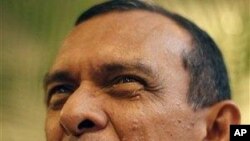Honduran President Porfirio Lobo is promising to crack down on a wave of violence that has gripped his country, including the killing of at least six journalists recently. Human rights concerns have mounted in Honduras since the ouster of President Manuel Zelaya last year.
The latest violence in Honduras occurred last week when a gunman opened fire on Jorge Alberto Orellana, the host of a television program in San Pedro Sula. Local news reports say the suspect fled after the shooting and remains at large. Police say they are investigating whether the killing of Orellana was related to his journalistic work or whether he was killed for other reasons.
Human rights groups say it is the latest in a string of recent attacks on journalists. At least five others have been killed, including two radio reporters who were gunned down while driving in rural Honduras last month.
The violence is putting pressure on the new administration of President Porfirio Lobo. At a conference hosted this week by the University of Miami, Mr. Lobo said violence must be stopped.
The president said he has named a special human rights advisor to ensure that no government institution is involved in human rights violations. And he said his administration is seeking outside help to investigate recent incidents.
Human rights experts with the Organization of American States, or OAS, are sending a team of investigators to Honduras to work with local officials. One of the key objectives of the mission is to learn whether the killings were politically motivated.
Officials in the United States and Latin American are watching to see how the Lobo administration responds to the violence.
Larry Birns, director of the research group Council on Hemispheric Affairs in Washington, says the violence is political and that Mr. Lobo faces a major challenge in rebuilding confidence in Honduran democracy. "These political murders represent an enormous step backward. And it makes it more difficult for [U.S. President Barack] Obama to simply say the situation in Honduras has been resolved. The situation in Honduras has not been resolved," he said.
President Lobo has named a commission to investigate alleged human rights violations that occurred after military forces removed his predecessor, Manuel Zelaya, from power last June. Mr. Zelaya's supporters accused the new government of taking part in the killing and disappearance of dozens of people.
U.S. President Barack Obama has welcomed the investigation. Several leftist governments in Latin America, however, have yet to accept the new president in Honduras and his efforts.
That division is playing out in the Organization of American States, which suspended Honduras from the democratic group as a result of the coup that forced Mr. Zelaya from office.
The U.S. ambassador to the OAS, Carmen Lomellin, says member states are debating whether to reinstate Honduras' membership. She says the military's role in Mr. Zelaya's removal as well as human rights concerns are points of concern. "Many think there has to be some responsibility for those who disrupted the democratic process," she said.
Speaking in Miami this week, President Lobo said Honduras should investigate what happened in June - not to identify those who should be brought to justice, but to learn from the experience. Human rights activists in Honduras and abroad say they will be watching to see whether those efforts are enough.
Journalist Killings Pose Challenge to New Honduran Leader







